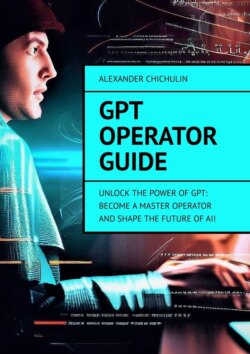Читать книгу GPT Operator Guide. Unlock the Power of GPT: Become a Master Operator and Shape the Future of AI! - - Страница 6
Introduction to GPT Operator
Education and Skills Required
ОглавлениеTo pursue a career as a GPT Operator, a combination of education and specific skills is essential. While formal education requirements may vary depending on the organization and specific job roles, here are the common educational backgrounds and skills that are beneficial for aspiring GPT Operators:
1. Education:
– Bachelor’s degree: A bachelor’s degree in computer science, data science, artificial intelligence, or a related field provides a strong foundation for a career as a GPT Operator. Relevant coursework may include machine learning, natural language processing, algorithms, and programming.
– Master’s degree: A master’s degree in the aforementioned fields can enhance your knowledge and expertise in AI and provide a competitive edge in the job market. Advanced coursework in deep learning, neural networks, and data engineering can be advantageous.
– Certifications: Completing certifications in machine learning, NLP, and cloud computing can demonstrate your proficiency and commitment to the field. Certifications from recognized institutions or platforms like OpenAI, Coursera, or Udacity can add credibility to your profile.
2. Technical Skills:
– Machine Learning and NLP: Strong knowledge of machine learning concepts, algorithms, and techniques is crucial. Familiarity with NLP tasks such as text classification, sentiment analysis, and sequence modeling is highly beneficial. Understanding transformer architectures, such as the ones used in GPT models, is essential.
– Programming: Proficiency in programming languages like Python is essential for GPT Operators. You should be comfortable with libraries and frameworks commonly used in machine learning and NLP, such as TensorFlow, PyTorch, or Hugging Face’s Transformers.
– Cloud Computing: Experience with cloud platforms like AWS, Azure, or Google Cloud is valuable for deploying and managing GPT systems. Knowledge of virtual machines, containers, and serverless computing is beneficial.
– Data Handling: GPT Operators should be skilled in working with large datasets, data preprocessing, and data cleaning. Experience with data manipulation libraries like Pandas and data storage technologies like SQL or NoSQL databases is advantageous.
– Problem-Solving and Analytical Skills: GPT Operators should have strong problem-solving abilities, be adept at analyzing system performance metrics, and have a data-driven approach to optimize GPT models and infrastructure.
3. Soft Skills:
– Communication: Effective communication skills are essential for collaborating with cross-functional teams, explaining complex concepts to stakeholders, and documenting procedures.
– Attention to Detail: GPT Operators should have a keen eye for detail to identify system issues, troubleshoot errors, and ensure the accuracy and quality of deployed models.
– Adaptability: The field of GPT operation is dynamic, with evolving technologies and best practices. GPT Operators should be adaptable to new methodologies, tools, and emerging trends.
– Continuous Learning: Keeping up with the latest advancements in AI, attending conferences, participating in online forums, and continuously upgrading skills are important for staying competitive in this field.
While a strong educational background and technical skills are important, practical experience through internships, personal projects, or participation in Kaggle competitions can significantly enhance your profile as a GPT Operator. Additionally, a genuine passion for AI and language processing, curiosity, and a willingness to learn are qualities that can set you apart in this field.
